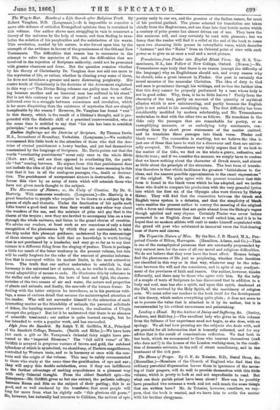idyls from the Sanskrit. By Ralph T. H. Griffiths, M.A.,
Principal of the Sanskrit College, Benares. (Smith and Elder.)—We have here just such a gift as Mr. Tennyson's Oriental fairy might have pre- sented to the "imperial Eleanore." The "full sail'd verse" of Mr. Griffith is arrayed in gorgeous vesture of brown and gold, the subdued Splendour of which is symbolical, we should say, of Eastern magnificence, controlled by Western taste, and so in harmony at once with the con- tents and the origin of the volume. This may be safely recommended to those who study at the same time the gratification of eye and ear ; they will enjoy this double satisfaction, even if they are indifferent to the farther advantage of making acquaintance in a pleasant way -with early Oriental thought. From the oldest Sanskrit epic—the Ramayana—.Mr. Griffith gives us but one extract, the pathetic colloquy between Rama and Site on the subject of their parting ; this is so good, and so well rendered by the traastator, that most people will long for more from what he rightly calls "this glorious old poem." lie, however, has naturally had recourse to Calidasa, the reviver of epic
poetry early in our era, and the greatest of the Indian names, for most of his poetical garland. The pieces selected for translation are taken chiefly from the Raghuvansa, and are done into that heroic metre which a century of prize poems has almost driven out of use. They have the due sonorous roll, and. may certainly be read with pleasure ; but we fancy that the reader will find it a relief at the end of the book to come upon two charming little poems in octosyllabic verse, which describe " Autumn " and the " Rains " from an Oriental point of view with such power as to give us at once a real and a novel picture.






























 Previous page
Previous page